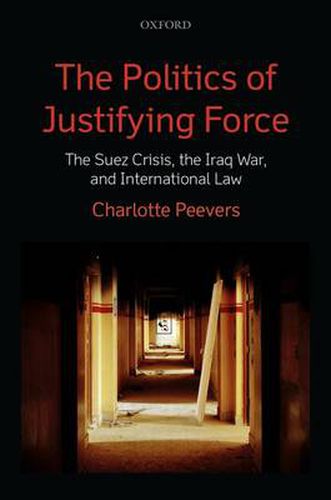The Politics of Justifying Force: The Suez Crisis, the Iraq War, and International Law
Charlotte Peevers (Lecturer in Law, University of Technology, Sydney)

The Politics of Justifying Force: The Suez Crisis, the Iraq War, and International Law
Charlotte Peevers (Lecturer in Law, University of Technology, Sydney)
What are the politics involved in a government justifying its use of military force abroad? What is the role of international law in that discourse? How and why is international law crucial to this process? And what role does the media have in mediating the interaction of international law and politics?
This book provides a fresh and engaging answer to these questions. It introduces different actors to the study of international law in this context, in particular highlighting the importance of institutional actors and the role of the media. It takes a theoretical approach, informed by detailed empirical analysis of key case studies, which challenges the traditional distinction between the spheres of ‘the international’ and ‘the domestic’ in global affairs, and the role of international law in the making of public policy.
The book specifically critiques the idea of the ‘politics of justification’, which argues that deploying international legal norms to justify governmental decisions resulting in the use of force necessarily constrains government actions, and leads to fewer instances of military intervention. The politics of justification, on this account, can be seen as a progressive practice, through which international law can become embedded in domestic societies.
The book investigates the actors engaged in this justification, and the institutional contexts within which legal justification is articulated, interpreted, and contested. It provides a rich, detailed account of domestic British discourse in the crucial case studies of the Suez Crisis of 1956 and the Iraq War of 2003, making extensive use of archival material, newspaper and television reporting, Parliamentary debates, polling data, personal memoirs, and the declassified material provided to several Public Inquiries, including the Chilcot Inquiry. In light of these sources, it considers the concept of international law as a language and form of communication rather than a set of abstract norms. It argues that a detailed understanding of how that language is deployed, both in private and in public, is essential to gaining a deeper understanding of the role of international law in domestic politics.
This book will be illuminating reading for scholars and students the use of force in international law, historians, and media theorists.
This item is not currently in-stock. It can be ordered online and is expected to ship in approx 4 weeks
Our stock data is updated periodically, and availability may change throughout the day for in-demand items. Please call the relevant shop for the most current stock information. Prices are subject to change without notice.
Sign in or become a Readings Member to add this title to a wishlist.


